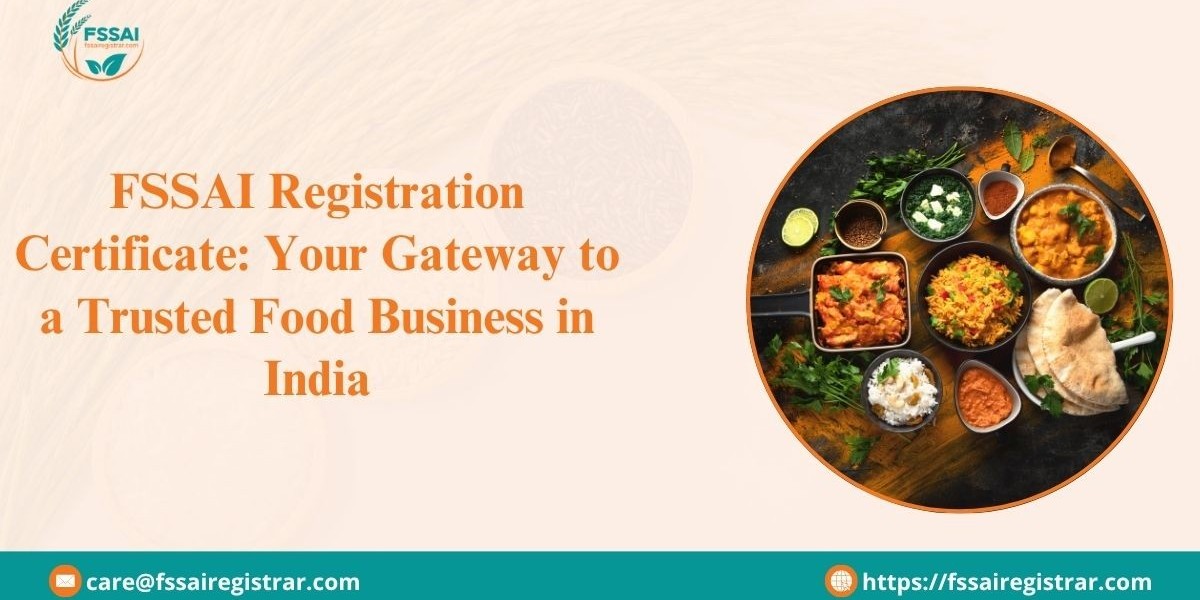Introduction
In India, the food industry is growing at a rapid pace, with small home kitchens, food startups, cloud kitchens, and traditional eateries popping up everywhere. During this boom, one thing that keeps customers safe and businesses trustworthy is the FSSAI Registration Certificate. Issued by the Food Safety and Standards Authority of India (FSSAI), this certificate is not just a government formality—it’s your license to build a safe and trusted food brand.
In this article, we’ll explore the unique importance of the FSSAI registration certificate, not just as a legal requirement, but as a strategic tool for business growth and consumer trust.
What Is an FSSAI Registration Certificate?
The FSSAI Registration Certificate is a document issued to food businesses in India under the Food Safety and Standards Act, 2006. It certifies that the business complies with the required safety standards in food handling, manufacturing, processing, storage, and distribution.
There are three types of FSSAI licenses based on the business scale:
Basic Registration – For small businesses with a turnover below ₹12 lakh/year
State License – For businesses with turnover between ₹12 lakh and ₹20 crore/year
Central License – For large businesses, exports, imports, or multi-state operations
Why the FSSAI Certificate Is More Than Just a Compliance Badge
Most people assume the FSSAI certificate is just a formality to stay on the right side of the law. But in truth, it is so much more. Here’s how:
A Sign of Credibility in a Crowded Market
In a market full of unregulated food vendors, the FSSAI certificate gives your business a clear identity as a trusted and quality-driven food brand. Whether you're running a home bakery, a cloud kitchen, or a multi-outlet chain, the FSSAI number sends a strong message to consumers:
“This food is safe.”
Essential for Brand Growth and Expansion
Looking to scale your food business?
Want to get listed on Swiggy, Zomato, or Amazon Pantry?
Want to export your products or sell in bulk to retailers?
All of these platforms and processes require a valid FSSAI certificate. Without it, you miss out on massive growth opportunities.
Makes You Eligible for Government Schemes
Government schemes like:
PMFME (PM Formalization of Micro Food Processing Enterprises)
Mudra Loans
Women Entrepreneurship Programs
often require applicants to have an FSSAI registration certificate. It’s a key to unlocking financial aid and government recognition.
Empowers Small Entrepreneurs and Home Chefs
Many women entrepreneurs, especially those running small tiffin services or home bakeries, think an FSSAI certificate is only for big restaurants. But the Basic Registration is designed just for them. It helps:
Build trust in the neighborhood
Sell on digital platforms
Partner with event caterers or local retailers
Enables Export of Food Products
Planning to export pickles, spices, or organic snacks? Then, FSSAI registration is mandatory. Without it, you can’t clear customs or meet international trade norms. Many countries trust food coming from India only when it bears the FSSAI-approved label.
Protects Consumers and Strengthens Food Safety
From labeling to hygiene, the FSSAI guidelines aim to protect consumer health. The certificate ensures you are regularly checking:
Food packaging
Expiry dates
Storage conditions
Water quality
This not only avoids penalties but also improves your food quality over time.
Builds a Transparent and Responsible Ecosystem
The FSSAI certificate mandates record-keeping and audits (for medium/large businesses), which brings accountability into your operations. It promotes a responsible food culture that benefits both producers and consumers.
Who Needs an FSSAI Registration Certificate?
You must apply for an FSSAI certificate if you fall under these categories:
Food manufacturers or processors
Food packaging units
Food traders or wholesalers
Import/export food dealers
Canteens, clubs, and hotels
Food delivery aggregators (cloud kitchens, tiffin services)
Online food sellers and resellers
Even a small home-based food business with a ₹50,000 monthly turnover should legally register with FSSAI.
How to Get an FSSAI Registration Certificate Online
Applying for the certificate is easier than ever. Here’s a quick guide:
Visit the FSSAI Website: Start by going to the official FSSAI registration portal online.
Fill in Basic Details: Enter your personal and business details—like your name, phone number, email, business name, type of food you deal with, business type, and full address.
Upload Your PAN Card: Add a scanned copy or photo of your PAN card as part of the application.
Double-Check and Submit: Review all your information to make sure it’s correct, then hit the "Submit" button.
Pay the Registration Fee: Pay the applicable fees online using UPI, debit/credit card, or net banking. The fee depends on your license category.
OTP Verification Call: You’ll receive a call from our team to verify your mobile number or email using a one-time password (OTP).
Inspection (If Needed): In some cases, FSSAI officers may visit your premises for a quick inspection.
Get Your License: Once everything is approved, your FSSAI license will be available for download from the official website.
Documents Required for FSSAI Certificate
Here’s a simple list based on your license:
For Basic Registration:
Photo ID proof
Business details
Address proof
For State/Central License:
Business registration docs
Food safety management system plan
List of products
Water testing report (for water-based products)
Nominee details
How Long Is the FSSAI Certificate Valid?
The certificate is valid for 1 to 5 years, depending on what you choose during registration. It must be renewed before expiry to avoid penalties.
Consequences of Not Having an FSSAI Certificate
If you run a food business without an FSSAI license:
You can face a fine of up to ₹5 lakh
You risk business closure
You lose customer trust
You cannot advertise or sell legally
Using Your FSSAI Certificate Effectively
Once you have your certificate:
Display your FSSAI number at your shop or website
Mention it on the packaging and delivery boxes
Promote it in your marketing content to show you’re certified
Renew it before expiry to stay compliant
Note:- Now you can easily apply for Tatkal FSSAI Registration
Conclusion
The FSSAI Registration Certificate is more than a legal requirement—it's your pass to building a respected and reliable food business in India. Whether you're just starting out or already in the game, this one certificate can be the difference between short-term hustle and long-term success.







